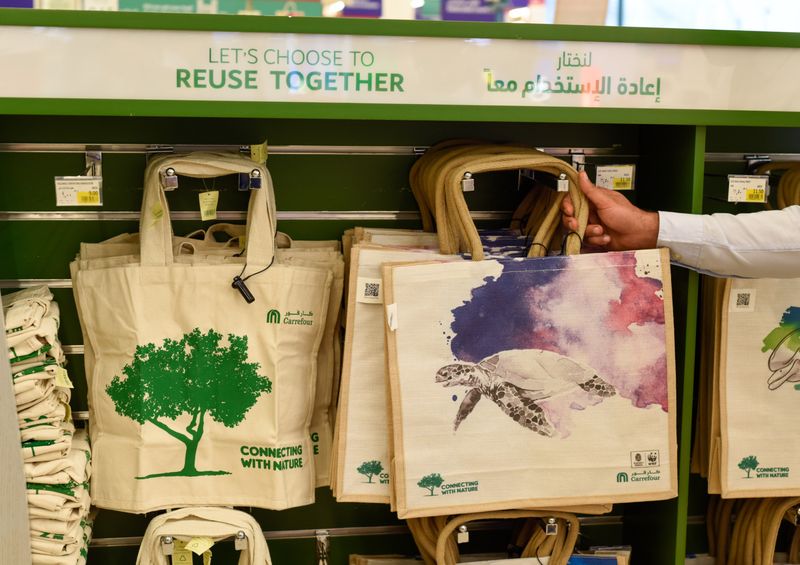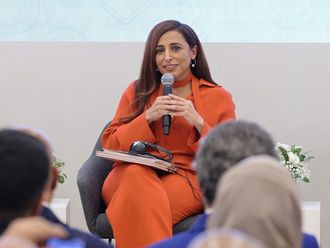
Abu Dhabi: It has been nearly three months since the UAE began implementing regulations to curb the use of single-use plastics in the country, and the initiatives have resulted in marked changes in resident behaviour.
From bringing along their own tote bags for grocery shopping to opting not to take a bag for small purchases, the regulations in Abu Dhabi and Dubai have been pushing shoppers to consciously reduce their dependence on plastic bags.
Abu Dhabi’s ban on the distribution of single-use plastic bags at cash counters in the emirate first went into effect on June 1, with retailers mandated to offer reusable bags instead. A month later, Dubai imposed a 25-fil tariff on single-use plastic bags, with plans to ban the bags completely within two years.
High rate of usage
The initiatives are part of the UAE’s efforts to reduce the use of single-use plastics. A report shared at the World Government Summit in 2019 had shown that the rate of plastic bag use in the UAE is nearly four times the global average. This amounts to 11 billion plastic bags each year, or 1,182 plastic bags per person per year in the UAE, compared to the global average of 307 bags per person per year.

Making a difference
“The policy is definitely making a difference, and we see up to 70 per cent of our shoppers bringing their own bags. When the regulations were first implemented, people would often forget, and would have to purchase a bag to take their groceries home. But this has changed, with more and more people opting to reuse bags. The government has been very clear on its goals, and as a policy to reduce the UAE’s consumption of plastic bags, it is certainly proving effective,” V Nandakumar, director of marketing and communications at Lulu Group International, told Gulf News.
The change in consumer behaviour is also apparent in the fact that when asked, shoppers will often opt not to take a bag at all.
Change in behaviour
“Earlier, customers buying a single water bottle would also expect to take it home in a plastic bag. This is definitely not the case now. It isn’t clear whether customers choose not to ask for a bag because they are environmentally more mindful or because they have to pay for any bag that we offer in Abu Dhabi, but there is an obvious change in behaviour,” added Nora Talal, multimedia officer in marketing and customer service development at the Abu Dhabi Cooperative Society.
The numbers are still not readily available, but retailers say the number of reusable bags sold has been gradually declining. This likely indicates that shoppers now have reusable bags at hand, and that they remember to bring their own bags.
Customer strategies
“We often see customers refusing bags for large items with handles, like detergents or oil canisters. In addition, some customers choose not to take any bags at all, and simply unload their groceries directly into their cars,” Talal explained.
Speaking to Gulf News, customers said they have adopted a number of different methods to reduce their reliance on plastic bags.
“Very frankly, I feel the policies have helped me reduce the waste of plastic bags by 80 per cent,” said Maroun Farah, 42, a media relations manager and father-of-three from Lebanon.
Farah keeps a stash of reusable bags in his car, and said his wife does the same. The Abu Dhabi resident said he also consciously chooses not to have his online shopping delivered in bags whenever the option is made available.
“Initially, I certainly forgot to take bags with me when I went shopping, and ended up having to pay for new ones. That’s why I began keeping bags in the car,” he said.
For a while, Farah and his family have also been recycling any plastic bags they do not end up reusing.
“We take it to a recycling facility near our home,” he said.

Saloni Kumari, 35, a public relations manager from India, feels the new regulations have pushed everyone to do their bit towards protecting the environment.
“We have long used shopping bags as bin liners, and to carry our own items with us when we go out. Still, these regulations are a clear reminder about the detrimental effects of plastic overuse,” Kumari said.
While she hasn’t exactly changed how and where she shops, Kumari said she keeps bags in her car to take along in case she pops into a store. She also often returns any that come with online deliveries.
“The tariff on single-use plastic bags spurs us to remember and do more,” she said.
It’s not uncommon to see residents still storing single-use plastic bags to use when they go shopping. But because these bags tear quickly, many residents said their store of plastic bags had finally been exhausted.
“Earlier, I would simply bring home more bags with every shopping trip. And although I did reuse them, there was always more coming in than I could use up. Now, I’ve finally used up my pile of single-use plastic bags,” one Abu Dhabi resident said.

What next
The regulations to reduce plastic bag usage are part of raft of other initiatives designed to decrease the use of single-use plastics as a while. The Dubai Can initiative, for instance, aims to encourage reuse of water bottles. Abu Dhabi also has an initiative in place with the Department of Municipalities and Transport that gives bus commuters collectable points for returning plastic bottles, and these can be reimbursed for bus rides.
Meanwhile, other emirates in the UAE have also announced upcoming bans on single-use plastic bags, including Sharjah and Ajman.
Abu Dhabi is also planning to phase out styrofoam products by 2024. At present, officials from the Environment Agency Abu Dhabi, the emirate’s environment sector regulator which has taken the lead on eliminating the use of single-use plastics, is working with community volunteers to spread awareness among small groceries and stores about the ban on single-use plastic bags.
How to reduce plastic bag use
-Take along your own bags when you go shopping.
-Leave a stash of reusable bags in your car that you can reach for at all times.
-Unload groceries from the shopping cart directly into the car. It also helps to have some bags in the car that you can use to carry your groceries home.
-For large items with handles, forego a bag and simply carry it home using the handles.
-Similarly, forego a bag for small individual items like water bottles, chocolates and other snacks.
-Buy in bulk if possible.
-When ordering online, request to have the order delivered without bags, or choose the option that offer bag-free delivery.











